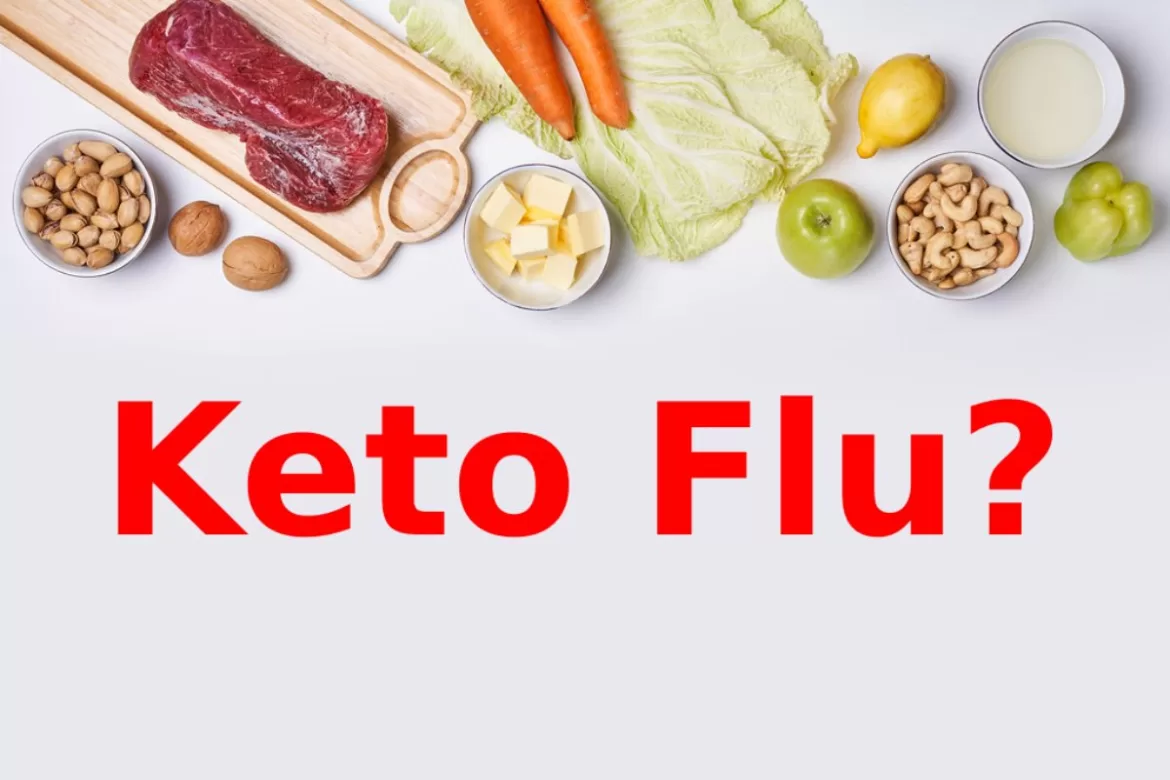A ketogenic diet can cause a variety of unpleasant symptoms called the “Ketosis Flu” (keto flu), which typically occurs within a few days to a week after beginning the diet.
A (ketogenic) Keto diet, is a type of fasting that has become fashionable as a natural technique to lose weight, get in shape, and improve overall well-being. The food plan is primarily low in carbohydrates but rich in fat and protein.
What is Keto Flu?
The keto flu is a set of adverse effects that people on the keto diet may experience. The symptoms, on the other hand, are usually modest and only last for a few days to a couple of weeks in total. The body’s adaptation to a reduced-carb diet and the induction of ketosis can cause these negative effects. The symptoms are caused by abrupt changes in energy sources, such as insulin and minerals. The keto flu does not affect everyone on the keto diet.
A radical shift to a diet that is mostly or entirely devoid of carbohydrates might be quite tough, and the body may need time to get used to this new style of eating. Some people may start a ketogenic diet without experiencing any negative side effects, whereas others may develop ketosis flu and the following symptoms as a result of it.:
- Nausea
- Headache
- Irritability
- Dizziness
- Vomiting
- Constipation
- Weakness
- Muscle cramps
- Diarrhea
What causes ketosis flu?
Carbohydrates are the body’s main source of energy. By drastically reducing carbohydrates on the keto diet, the liver is forced to use its reserves instead of glucose from carbohydrates. The liver is unable to make enough glucose to meet the body’s energy demands, resulting in fatty acids being broken down by the body.
The metabolism of ketones occurs when carbohydrates are completely depleted from the diet. The body’s cells switch to using ketone bodies as fuel, and the body enters a state of ketosis.
The body’s cells experience an inadequate supply of glucose as a result of the decreased blood sugar levels. As a consequence of water and electrolyte loss, dehydration and electrolyte imbalance occur. Insulin is considered to play a role in transporting glucose to the brain. The brain will have less fuel before it starts utilizing ketones for energy. The blood sugar will rise for a few days at the start of the diet before it returns to normal levels.
The body enters a state of dietary ketosis as it cares toward normalcy, and the symptoms generally go away. The blood level of a particular ketone body called beta-hydroxybutyrate (0.5 mmol/L or more) is one example.
5 tips to manage Keto flu?
The majority of ketosis flu symptoms go away on their own in a few days to a couple of weeks as the body adapts to the new diet. However, the symptoms may be prevented or reduced in intensity by following these guidelines:
- Keep yourself hydrated: The keto diet can rapidly drain your body of water and raise the danger of dehydration. Glycogen (a form of stored carbohydrate in the body) binds to water in the body. When dietary carbohydrates are restricted, glycogen is consumed and water is lost. Staying hydrated can help with side effects such as tiredness and muscle tightness.
- Avoiding strenuous exercise: The benefits of exercise are well-known, but strenuous activities should be avoided while suffering from keto flu symptoms. Following a ketogenic diet for seven days may result in unconsciousness, muscle cramps, and stomach upset. It’s a good idea to let the body rest for the first seven days as it recovers from such symptoms. It is safe to resume all types and degrees of exercise once the body has gotten used to the keto diet.
- Proper sleep is essential: Sleep deprivation causes cortisol levels in the body to rise, which can damage mood and exacerbate keto flu symptoms. As a result, getting enough rest and sleep is critical to managing keto flu symptoms.
- Make sure you’re getting enough fat (and carbs): When people transition to a very low-carb diet, they might want foods that are only accessible on the ketogenic diet, such as bread and pasta. Having good fat, which is necessary for ketogenic diet energy production, will assist in decreasing food yearnings and keep you full.
- Take supplements: Vitamin and mineral depletion is a possible long-term consequence of the keto diet. Vitamin supplements may be recommended by a doctor to ensure that the body gets enough calcium, vitamin D, zinc, and selenium. Some people report that keto diet supplements assist with symptoms and help the diet’s effects.
Is a ketogenic diet safe to follow?
The ketogenic diet can assist you to shed pounds more quickly in the short term because it reduces glycogen and water stores in the body. However, there is a danger of appetite suppression, which may lead to nutritional deficiencies and health issues in the long run.
Aside from weight reduction, a ketogenic diet has several health advantages. While the diet is generally safe for most individuals, it may have some drawbacks, particularly in the early stages (ketosis flu being an example). They are, however, typically not severe in healthy people. Before starting any new diet, regardless of the type, be sure to consult your doctor if you have existing health or medical issues.
The keto diet may provide numerous health benefits.
- It May help in weight loss
- May Lower Blood Pressure
- Reduces acne
- Reduce the risk of cancer cell growth
- Improves heart health
- May Enhance Brain Function
- Helps reduce seizures in people with epilepsy
Negative consequences of the ketogenic diet
Here are some side effects of the keto diet, but these are temporary and not serious.
- Ketos flu
- Bad breath
- Increased Heart Rate
- Leg cramps
- Digestive problems
References;
- https://www.medicinenet.com/what_are_the_symptoms_of_ketosis_flu/article.htm
- https://www.medicalnewstoday.com/articles/326276

